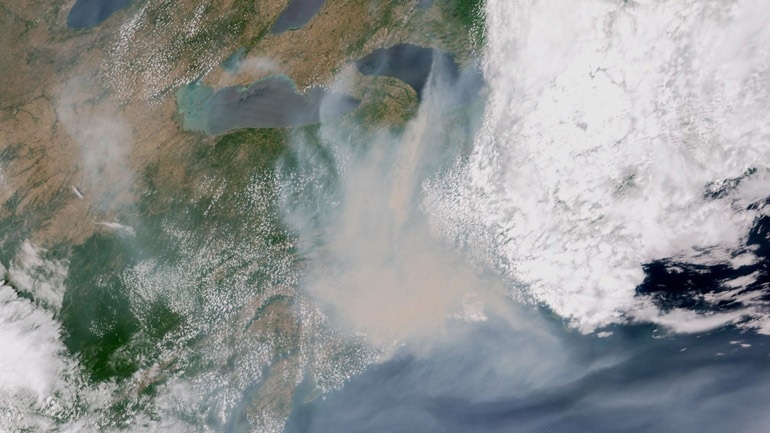The National Centre for Earth Observation (NCEO) is helping bring a group together to support data images for the public and analyst insight through its headquarters at Space Park Leicester.
 Smoke plume over the USA. Image Credit: Simon Proud/RAL Space/NCEO/NOAA
Smoke plume over the USA. Image Credit: Simon Proud/RAL Space/NCEO/NOAA
Researchers at the University of Leicester, King’s College London, and RAL Space have been tracking the devastating plume of smoke that has spread from Canada to areas of North America’s east coast.
Intense wildfires in Canada are generating massive amounts of smoke and gas, which are being pushed by the wind across Canada, the United States, and the Atlantic. On Wednesday, the smoke turned the sky orange and created the worst recorded air quality in two decades in New York.
Satellites are giving us compelling views of the nature of these truly continental-scale impacts on people’s everyday lives. The current situation is apparent to all but our research also shows elevated gaseous pollutants will have been emitted as well as smoke, impacting people directly but also changing the nature of the atmosphere right across the mid and high latitudes of the northern hemisphere. We are stepping up our monitoring efforts as a result of the current situation.
John Remedios, Professor and NCEO Director, University of Leicester
Professor Martin Wooster, NCEO Divisional Director at King's College London adds, “Wildfires are a natural part of Earth's environmental system, and places such as the boreal forests of North America have evolved to host fire as part of their ecosystem function. Fire activity in such regions varies in response to changes in climate and human behavior, and there is also simple natural variability as well.”
“Climate change is generally proceeding at a faster rate at higher latitudes, and there is good evidence that for example the length of the fire season in parts of Canada has widened with a resulting increase in the amount of fire occurring,” Professor Martin Wooster notes.
It has been acknowledged that this year is en route to becoming the most severe Canadian fire season. Although the fire season does not end until the fall (Autumn), Canada has supposedly reported 2133 fires so far this year, compared to an average of 1,726 wildfires up to the start of June during the last decade.
The pollution has been tracked by scientists at RAL Space NCEO using weather satellite images combined with powerful algorithms that assess the concentration of gases and smoke in the atmosphere. Using data from EUMETSAT’s MetOp-B satellite, the RAL Space IMS tool identified a massive carbon monoxide plume on June 6th, 2023, that spanned from Ottawa, Canada, to Washington and Boston, USA.
Thick smoke and carbon monoxide, a gas produced by the fires, are being blown from Canada across the North-Eastern United States - highlighted by the dreadful air quality seen in New York on 7th June. Using images from weather satellites, we are tracking the smoke and gases as they continue to be produced by fires that are still burning. Unfortunately, air quality is still bad across much of the Eastern US and will remain so for several more days at least.
Dr. Simon Proud, NCEO Scientist, RAL Space
Professor Martin Wooster, Divisional Director at NCEO and Professor of Earth Observation Science at King’s College London, is finalizing plans for an airborne science campaign to Canada later this year to thoroughly investigate boreal wildfires in conjunction with the Canadian Forest Service.
One of the campaign’s goals is to help evaluate the accuracy of the information now being delivered on fires around the world from Europe’s Sentinel-3 satellite, which is aimed at identifying and mapping fires and also assessing the amount of material they are putting into the atmosphere, which can cause clearly the types of air quality problems people are seeing now in North America.